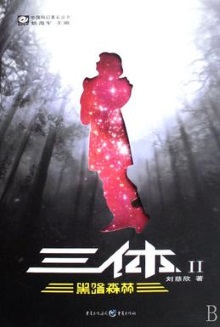
I held off reading this for the longest time because I didn’t like the first one all that much and I’d heard that the English translation, by Joel Martinsen this time instead of Ken Liu, was kind of weak. Still I kept running across references to it such as how even Barack Obama is a big fan and went to meet author Liu Cixin. I also realized that even in the English-speaking world, big idea science-fiction novels are rather rare and this is nothing if not all about big ideas.
Earth is now aware of the Trisolaran invasion fleet that will arrive in 400 years and the presence of the sub-atomic Sophons that both provides intelligence to the aliens and locks down human research in fundamental physics. Reasoning that the only secrets humanity can keep from the Trisolarans are the contents of brains, the UN selects four people to serve as so-called Wallfacers. They are given access to immense resources to do with as they wish with little accountability in the hopes that they can come up with long-term strategies to defeat the Trisolarans. The main character of the novel is Luo Ji, an astronomer and sociologist, who is only interested in finding his true love and living happily with his family. The story spans more than 200 years as the various Wallfacers are placed into hibernation as needed in order to wait for their plans to come to fruition. During this time, the Earth goes through up and downs, but one recurring problem is defeatism, the sense that humanity is doomed and that there is almost nothing that can be done about it.
Unlike the first book, there are almost no scenes set in the silly Three Body virtual world, for which I am grateful. The premise of the entire Earth gearing up to face an invasion in 400 years time is an enticing one. I don’t believe I’ve ever read a scenario like this before. I also think that Luo Ji is a much more interesting protagonist than Wang Miao and certainly the Wallfacers gimmick is original and adds a nice touch of drama. I enjoyed reading about the various strategies that they devised even if in the end all of them pretty much share the same theme. This book also fixes some problems from the first novel. I’d always thought it incredibly implausible given the state of Trisolaran technology that they would travel all this way for the sake of resources or a habitable planet. The Dark Forest theory that is the heart of this novel makes for a much more plausible motivation for the aliens. Based on all this, I liked this sequel quite a bit more than the first book.
Even so, this book has its own share of problems. Many people have complained about an extended sequence in which Luo Ji seemingly imagines his ideal lover into existence. It’s a poetic, almost mystical interlude. I would have been okay with it if it somehow ties back to his chosen strategy but it doesn’t, it merely provides a motivation for the character. As mentioned above, the various Wallfacer strategies didn’t turn out to be as surprising or intelligent as I had expected. All of them are predicated on the fact that humanity is doomed to lose any battle. Even Zhang Beihai’s twist turned out to be fairly lame to me being pretty much in line with the thoughts of the Wallfacers. Given the premise behind the Wallfacers, I expected a proliferation of Xanatos Gambits and got nothing like that. At the same time, I dislike how humanity keeps making critical mistakes due to what I like to call the psychology of large groups. Having Earth’s all bunched up in dense formation is dumb and the motivation of being fearful of being left out of a historical moment is ridiculous. Furthermore I don’t understand how Earth went through a catastrophe as severe as the Great Ravine, which killed more than two thirds of the population due to starvation, and yet the hibernating sleepers were kept alive.
I would still consider this to be a must-read novel, especially to fans of Western science-fiction, due to the sheer ambition of its scope and its big ideas. However I maintain that Liu is not an especially imaginative or intelligent writer. The most valuable thing here is that due to his drastically different cultural background, he brings perspectives and values that would not naturally occur to Western writers. Few people in the West for example would think to link Al-Qaeda to Asimov’s Foundation for example, and perhaps even fewer would see merit in creating a corps of suicide fighters to war against aliens. Also notable in that Western writers of interstellar scale science-fiction tend to be more optimistic and look to science for solutions. I think this is at least partially due to Star Trek, whose cultural influence in the West cannot be overstated. Liu’s vision on the other hand is pure darkness and by design cannot be solved by any scientific discovery.
There is one last book to go of course and the end of this novel seems to signal an abrupt shift in another direction. From what I know, the full consequences of the actions of characters like Zhang Beihai are only made known in the third book so I should reserve my judgment to some extent. I’m sure to read it though not right away. One last note, the plan of one of the Wallfacers was drastically changed in the English translation from the Chinese original. After reading up on what the original plan was, I surmise that this was due to it being too ridiculous to be even vaguely plausible. This only cements my impression that Liu is more of a throw ideas at a wall and see what sticks kind of guy than any really deep thinker.